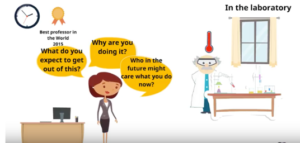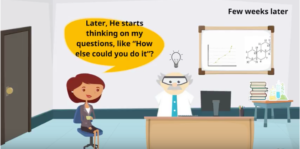Date/Time
Date(s) - 17/05/2019
13:30 - 15:30
Instructor
Mareike Smolka
Location
2.041
Categories
Organizer: Mareike Smolka
Mareike Smolka is a Junior Teaching Fellow at the University College and a PhD candidate at the Faculty of Arts and Social Sciences of University Maastricht. She teaches and coordinates the Research Methods course trajectory. Her expertise is in qualitative research, in particular ethnography. For her PhD research she has spent half a year in a biomedical research group in France where she observed, interacted with, and interviewed numerous researchers about ethical challenges and problems that occur in their daily work practices. For that purpose, she has been trained by and has collaborated with Professor Eric Fisher from Arizona State University. Prof. Fisher developed the STIR method to both study and improve responsible research in science and technology development (https://cns.asu.edu/research/stir).
Workshop description:
STIR stands for Socio-Technical Integration Research. It is a qualitative research method that has been used by researchers from the humanities and social sciences to STIR up the work of  natural scientists, engineers, and other technical experts. STIR studies differ from traditional ethnographies primarily because they seek to feed qualitative methods and perspectives back into the field of study. In other words, STIR researchers interact with and thereby change the research setting. The goal is to enable reflexive learning and then to assess the practical value of that learning to participants and others.
natural scientists, engineers, and other technical experts. STIR studies differ from traditional ethnographies primarily because they seek to feed qualitative methods and perspectives back into the field of study. In other words, STIR researchers interact with and thereby change the research setting. The goal is to enable reflexive learning and then to assess the practical value of that learning to participants and others.
For this purpose, STIR researchers make use of a decision-making matrix that they fill out together with a technical expert on a regular basis in order to map and unfold the experts’ everyday decision-making processes. The matrix serves as a basis for dialogue and collaborative reflection about the variety of ethical, social, material, juridical, and scientific considerations that play a role when developing possible alternatives to react to a problem, challenge or opportunity. In this way, STIR studies have helped technical experts to make informed decisions about technical alternatives that integrate a wide range of social and other considerations.
The STIR method, thus, pursues a twofold agenda: to both study and improve work practices. It has realized this agenda beyond scientific and engineering laboratories; for instance, in businesses, architectural offices and energy supply initiatives. The method may be used in any other context. You could STIR a fellow student to unfold and support his or her decision-making process when writing, a paper, studying for an exam or carrying out a (research) project.

We will discuss which questions to ask, which comments to make and not to make, how to feed back to your participant what you observe during the STIR dialogue, and how to analyze a transcription of the dialogue later in order to assess practical outcomes.
What are the methodology and/or methods that the workshop will cover?
In this workshop you will gain hands-on experience with using the STIR method. You will learn to use the STIR matrix and how to move through its four quadrants: Opportunity – Considerations – Alternatives – Outcomes.
To participate in this workshop, you will need to prepare the following material(s):
Please prepare articles and videos in the following order before attending the workshop:
- Read introduction to STIR: https://cns.asu.edu/sites/default/files/about-stir.pdf
- Watch an introduction to the STIR interview method: https://vimeo.com/148687460
- Watch Eric Fisher’s experience with using STIR: https://vimeo.com/149086757
- Read news article on STIR Cities: https://asunow.asu.edu/20151001-stir-cities
At the end of this workshop, you will have obtained the following skills:
- Gain more experience in dialogue-based qualitative research
- Sharpen your gaze when observing a participant during research dialogues
- Practice feeding back (preliminary) analysis and insights to research participants to stimulate a mutual learning process
- Combine research with practice improvement that is beneficial for your research participants
- Learn to analyze transcribed qualitative research dialogues
Booking is available from 23 April at 18:15.
Bookings
Registrations are currently closed for this event.